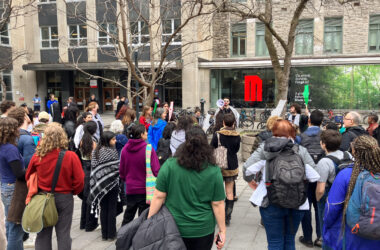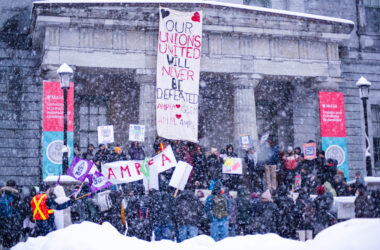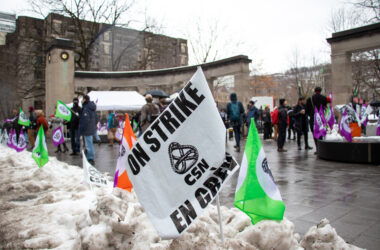On Mar. 2, a group of McGill alumni drafted an open letter to McGill’s administration in support of the McGill Hunger Strike for Palestine. As of March 10, it has received over 1,100 signatures from alumni, faculty, and students alike. The letter calls on McGill to meet the demands of the hunger strikers by cutting ties with corporations and academic institutions complicit in Israel’s ongoing siege on Gaza and the genocide of Palestinians.
The hunger strike was launched by twelve students on campus. Sage*, U3 Arts and member of McGill Hunger Strike for Palestine, told The Tribune that the strike came after the university ignored students’ continued demand that McGill take a stand against the genocide in Palestine.
“We have been protesting, emailing, and calling the Board [of Governors], and we just haven’t had any response back,” Sage said. “So for us, this was really our last chance to show them that we were actually very serious about this.”
The open letter, which started circulating eighteen days into the strike, urges McGill to meet the demands of the hunger strikers and divest from companies directly or indirectly supporting Israel’s genocide against Palestinians. Solidarity for Palestinian Human Rights (SPHR) estimates that these investments total approximately $20 million—including $519,949 in Lockheed Martin, $1,546,209 in Safran SA, $1,820,816 in Airbus SE, $1,217,646 in L’Oréal, $1,323,824 in Thales SA, $1,396,445 in Chevron Corp, $1,215,308 in Coca-Cola, $11,372,580 in Royal bank of Canada, and $605,482 in Unilever
The letter also supports hunger strikers’ demand that McGill boycott academic institutions complicit in the genocide of Palestinians, including universities involved in Israel’s military research and development. Although the university has stated that they will not cut ties with academic institutions because of where they are located, the letter asserts that the boycott demands were not linked to the institutions’ location but rather stemmed from their involvement in the human rights abuses against Palestinians.
The letter reads, “We wish to emphasize that the calls to cut ties with Israeli academic institutions are not aimed at institutions because of where they are located. Rather, they are aimed at specific Israeli institutions with well-documented records of complicity in human rights violations against Palestinians.”
The authors of the letter also condemn McGill’s response to the hunger strike. Sage explained that although the McGill administration has been willing to meet with the hunger strikers, they have been unable to agree on the terms of a meeting. On Feb. 19, McGill invited the hunger strikers to meet with them. On Feb. 21, the hunger strikers responded, asking for a public meeting so that students supporting the cause could attend and asked McGill to set the meeting a week in advance so that hunger strikers could sufficiently prepare. They also asked to meet for at least an hour and a half so they would have enough time to discuss their demands.
According to the group, on Feb. 28, the McGill administration agreed to these terms and set a meeting date for Mar. 11. However, they quickly rescinded the offer. Later that day, the McGill administration stated that although they would be willing to explore a public meeting in the future, they wished to have a private meeting with the strikers on Mar. 4, given the health risks of a hunger strike and the urgency of the situation. Strikers refused the terms of this meeting, maintaining that they were uninterested in discussing the health of the strikers. In response, McGill stated that they felt a meeting to discuss the hunger strikers’ demands would be unproductive. Consequently, discussions stalled and students continued their strike over the reading break.
“McGill supports the rights of students to exercise their rights in connection with civic engagement in accordance with the Charter of Student Rights and applicable laws [.…] It is equally important to note that all members of our community have the right to learn, teach and work in a peaceful environment. Any civic engagement that results in a hindrance of those rights is not acceptable,” McGill’s media relations officer Frédérique Mazerolle wrote to The Tribune.
Although the hunger strike does not interfere with the conduction of classes, SPHR, asserted that “[the hunger strikers] demonstrate how McGill’s inaction and refusal to heed student demands has pushed committed students to extreme forms of protest.”
Sage told The Tribune they were hopeful the letter would pressure the university to take the demands of the hunger strikers seriously.
“[The letter] legitimizes our strike,” Sage said. “We believe that support from alumni, staff, and faculty is a good step forward.”









“Palestinians” are Muslim Arabs. There are 49 Muslim countries in the world (according to Wikipedia), but a single, tiny Jewish state (20% of whose citizens are Arab). I am an agnostic Canadian woman (of Swedish and Irish origin). Hamas is a terrorist organization. Anyone who was not utterly horrified by what occured on October 7th has no heart.